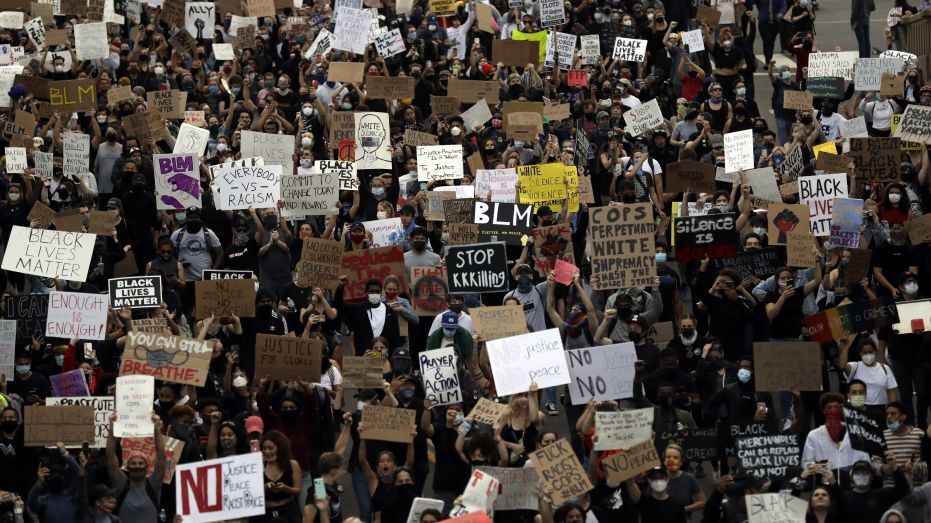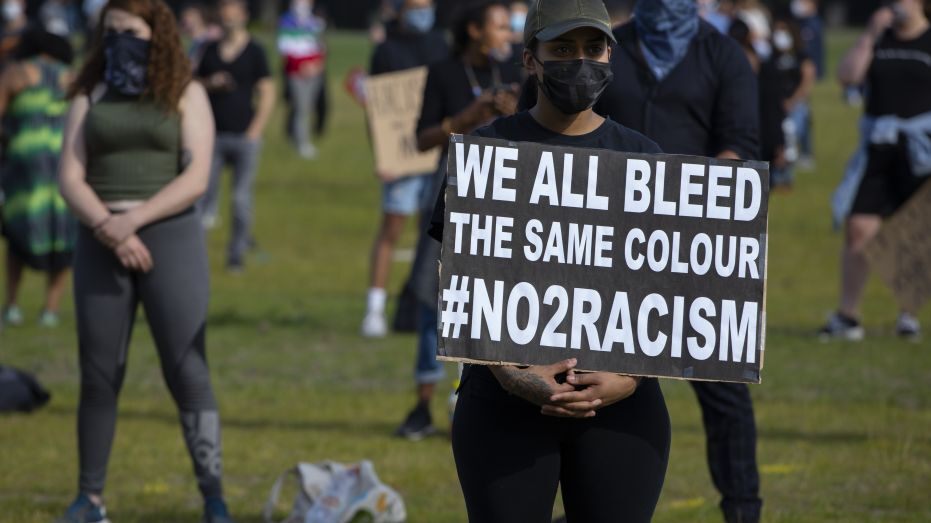Companies including Netflix and Twitter have spoken out in support of nationwide protests over the death of George Floyd. FOX Business’ Susan Li and Lauren Simonetti with more.
Leaders of General Motors Co., Johnson & Johnson, American Airlines Group Inc. and other big businesses gathered this week for a roundtable about the business impacts of the coronavirus. With protests gaining momentum across the U.S., the participants quickly changed the subject.
Continue Reading Below
What followed was a rare peer-to-peer conversation among more than 300 chief executives, mayors and government officials about race relations and social justice—and the public role plenty of CEOs now see for themselves.
American Airlines‘ Doug Parker talked about deciding his comments on political and social issues matter. Executives from International Business Machines Corp. brought up concerns about the experience of their black employees, and GM’s Mary Barra talked about the need to provide education and career opportunities for African-Americans. Many participants in the call stayed silent, but a number of CEOs said they have decided that speaking publicly about issues is part of the job—a marked change from earlier eras, when executives avoided statements that could be seen as political.

Protesters march Thursday, June 4, 2020, in San Diego. Protests continue to be held in U.S. cities, sparked by the death of George Floyd, a black man who died after being restrained by Minneapolis police officers on May 25. (AP Photo/Gregory Bull)
Johnson & Johnson CEO Alex Gorsky said that while leaders may wish to view themselves as removed from politics, their actions telegraph values.
TWITTER, NETFLIX ANNOUNCE SUPPORT FOR BLACK LIVES MATTER AFTER GEORGE FLOYD KILLING, RIOTS
“There are few decisions we make that aren’t political—whether it’s access to restrooms, whether it’s what candidate we might support in a particular stand that we’re going to take on an environmental issue—so, frankly, I think that comes with the territory,” he said.
American’s Mr. Parker said recent events have changed his thinking about taking stands on potentially controversial topics.
“Sometimes we convince ourselves, look it’s not really my responsibility as a CEO to opine on this or make a statement on this,” he said. “Oftentimes you think, well, it’s not going to matter, because who am I to be making comments on this? It does matter.”

U.S. Airways CEO Doug Parker announces the planned merger of AMR Corp, the parent of American Airlines, with U.S. Airways during a news conference at Dallas-Ft Worth International Airport February 14, 2013. (UNITED STATES – Tags: BUSINESS TRANSPORT)
Curing the world’s ills is a popular topic among business leaders at gatherings like the annual World Economic Forum summit in Davos, Switzerland, but messages of corporate activism are often dismissed as lip service that rarely involve actions that would hurt the bottom line. The CEOs this week stressed a heightened sense of urgency and responsibility to drive change.
Merck’s Kenneth Frazier, one of just four black CEOs in the Fortune 500, said he fears democracy in the U.S. is fragile. “We have to be very careful not to assume that this experiment that we have called ‘America’ can withstand our apathy right now,” he said on the call, later adding that business can play a role in areas from police violence to minority communities’ access to capital.
Mr. Frazier—who earlier this week said George Floyd, the Minnesota man killed in police custody last week, “could be me”—said that businesses need to lead on issues like police reform, access to capital and economic opportunity for black Americans. Mr. Frazier has taken stands in the past.
JAMIE DIMON REACTS TO FLOYD PROTESTS: JPMORGAN COMMITTED TO ‘FIGHTING RACISM‘
New IBM CEO Arvind Krishna urged the leaders to talk directly with black employees about their experience of the events of the past two weeks. “Keep it about the race issue right now,” he said.

People observe social distancing as they take part in a demonstration in The Hague, Netherlands, Tuesday, June 2, 2020, to protest against the recent killing of George Floyd, police violence and institutionalized racism. (AP Photo/Peter Dejong)
Executives’ outspokenness on political and social issues is still relatively new. Reflexively deflecting controversy—to avoid the risk of angering customers, shareholders, employees or board members—began to change with the push to legalize same-sex marriage and corporate support of gun regulation and climate-change action. More broadly, surveys increasingly show that consumers and employees expect bosses and brands to articulate values. Chiefs of consumer-facing brands have said they feel pressure to align with their customers.
Mr. Parker gained attention earlier this week when he was spotted on a Southwest flight reading “White Fragility: Why It’s So Hard for White People to Talk About Racism,” by Robin DiAngelo. When a black flight attendant asked how he liked the book, it led to an emotional conversation. She later posted about the exchange on Facebook.
“The fact that it’s public is only because of what I do,” he said on the call, “and it is again a message to all of us that we do is really important.”
Jeffrey Sonnenfeld, a Yale School of Management professor who organized Wednesday’s conclave and invited some reporters, typically gathers executives and former and current public officials privately. He said he had intended to steer Wednesday’s conversation back to Covid-19, but got messages from participants urging him to stay on the topic of racism and civil unrest.

Demonstrators take part in a protest in response to the death in Minneapolis police custody of George Floyd, in Los Angeles, California, U.S., June 3, 2020. (REUTERS/Patrick T. Fallon)
GET FOX BUSINESS ON THE GO BY CLICKING HERE
“People needed the catharsis of talking about [it], but they also knew that they’re being held accountable by peers to do something about it,” Mr. Sonnenfeld said. “It was a watershed moment.”
Former PepsiCo Inc. Chief Executive Indra Nooyi commended CEOs for taking stands on issues, but spoke bluntly about the realities involved. Ms. Nooyi faced a boycott in 2016 after making comments interpreted as critical of Donald Trump, then president-elect. When she took political positions during her tenure, she said, a third of employees lauded her, a third sent nasty emails and a third stayed quiet. “So you could interpret it as two-thirds are on your side, or two-thirds are against you,” she said.


